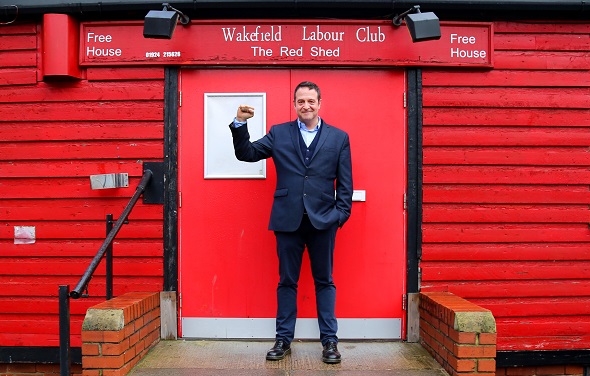For this year’s show, activist-comedian and Traverse regular, Mark Thomas, takes us to The Red Shed, a Labour club in Wakefield, that is literally that – a wooden building, painted red. It’s a hotbed of political debate, a place to drink (obviously), a hub for the community to gather in times of celebration or sadness, and reconstructed here to mark its fiftieth anniversary, with audience members taking the place of regulars and committee reps. There’ll be nothing redder in politics, blood or stage design at this year’s Fringe.
Thomas was a regular at the Shed during his time as a drama student at nearby Bretton Hall, and was schooled in the politics of resistance and solidarity there during the Miners’ Strike, earning an honorary NUM badge for his commitment. An abiding memory is of the march back to work that year, seeing a small band of schoolchildren, faces pressed to the railings, singing in solidarity with their dads, uncles, grandads and brothers. His anniversary tribute to the Shed and its community, to which he retains ties, is to retrace those steps and see if his recollections are true or merely a romanticised figment of his imagination.
Politically, waters have rarely been choppier for the left. Thomas is pitching this to the usual tame crowd, but in the knowledge that even among progressives, division is widespread. It is perhaps for the best then that this piece reflects on a past when the enemy was clearer and uniting easier. Corbyn and the current battle for the soul of Labour can be skirted over; it could easily split a crowd of Fringe-going lefties. Brexit’s not so easily avoided. Wakefield and Barnsley, like places all over the abandoned north, voted overwhelmingly to leave, and blamelessly too. Thomas himself is magnanimous and wholly right on this point. The devastation wrought by the Miners’ Strike goes a long way to explain and, as if needed, to “justify” a vote against the status quo. Sneering at working-class Brexit voters is missing the point.
In the main though, the show speaks strongly of the power of community association, and does so with admiration and respect for those who oil the wheels at that level, if lightly mocking the club committee stereotypes in a not-half-bad Yorkshire accent. As we visit the abandoned pits, all now McDonalds and Tescos and housing, it’s the uncowable people of Yorkshire that come across most powerfully. Brass bands are not in evidence this evening, but singalongs are. The spirit of the Shed is evident.
As a political piece, given the current situation, it acts to galvanise the left for whatever hell lies ahead. Although in truth, while solidarity might be important right now, being reminded of the last time the Tory government steamrollered straight over it has the opposite effect. Is there another way to progress?
As theatre, it’s obviously attention grabbing. No one of any political colour could deny the skill with which Thomas can work a room and deliver a spittle-flinging diatribe. They trained him well at Bretton Hall.
But it is as a tribute to the folk at the Red Shed and those that went before them that it needs to make its mark, and it does so superbly. The practical, community-minded spirit and worldly wisdom of the Red Shed’s clientele shines through and stirs the soul. Enough to leave this Yorkshireman too choked to join in the finale.
